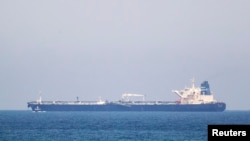LONDON —
Iraqi Kurdistan looked set to unload its first cargo of disputed crude oil in Israel from its new pipeline after weeks of seeking an outlet as Iraq's central government has threatened legal action against any buyer.
The SCF Altai tanker was anchored near Israel's Ashkelon port early on Friday morning, ship tracking and industry sources said. The tanker is expected to dock early on Saturday, local sources said.
Securing the first sale of oil from its independent pipeline to the Turkish port of Ceyhan is crucial for the Kurdish Regional Government as it seeks greater financial independence from war-torn Iraq.
But the new export route to Turkey, built to bypass Baghdad's federal pipeline system, has created a bitter dispute over oil sale rights between the central government and the Kurdish Regional Government (KRG).
The first tanker of its pipeline oil is still homeless after loading in May. After a false start sailing to the United States, the United Leadership tanker turned back towards Morocco, where it is anchored after local authorities refused to let it discharge for the Mohammedia refinery.
It was not clear whether the crude in the SCF Altai has been sold to a local refiner or was slated to discharge into storage, potentially for another destination.
"We do not comment on the origin of crude oil being imported by the private refineries in Israel,'' an Israeli energy ministry spokeswoman said.
The SCF Altai did not arrive directly from Ceyhan.
The United Emblem was the second tanker to load crude at Ceyhan from the KRG pipeline at the start of last week. It then made a ship-to-ship transfer near Malta to the SCF Altai, local shipping and market sources said and ship tracking showed.
Israeli refineries have taken Kurdish crude oil before but in small volumes, which were shipped to Turkish ports by truck. Some oil has also been stored there.
The KRG began exporting a small volume of its Taq Taq crude grade by truck to Turkey in early 2013 and then added another grade Shaikan at the start of this year.
Israel has less to lose than other U.S. or European refiners, because it has no contract for Iraqi oil. Iraq participates in the boycott of Israel along with many other Arab states.
Italy has warned traders and refineries about the legal risks of importing the oil. Large companies with oilfield interests in southern Iraq have stayed clear, although a joint refining venture by Rosneft and BP used a cargo of trucked oil in May.
The KRG's pipeline is currently pumping around 120,000 barrels per day to Ceyhan. The region's natural resources minister is aiming to export 400,000 bpd by year-end.
The SCF Altai tanker was anchored near Israel's Ashkelon port early on Friday morning, ship tracking and industry sources said. The tanker is expected to dock early on Saturday, local sources said.
Securing the first sale of oil from its independent pipeline to the Turkish port of Ceyhan is crucial for the Kurdish Regional Government as it seeks greater financial independence from war-torn Iraq.
But the new export route to Turkey, built to bypass Baghdad's federal pipeline system, has created a bitter dispute over oil sale rights between the central government and the Kurdish Regional Government (KRG).
The first tanker of its pipeline oil is still homeless after loading in May. After a false start sailing to the United States, the United Leadership tanker turned back towards Morocco, where it is anchored after local authorities refused to let it discharge for the Mohammedia refinery.
It was not clear whether the crude in the SCF Altai has been sold to a local refiner or was slated to discharge into storage, potentially for another destination.
"We do not comment on the origin of crude oil being imported by the private refineries in Israel,'' an Israeli energy ministry spokeswoman said.
The SCF Altai did not arrive directly from Ceyhan.
The United Emblem was the second tanker to load crude at Ceyhan from the KRG pipeline at the start of last week. It then made a ship-to-ship transfer near Malta to the SCF Altai, local shipping and market sources said and ship tracking showed.
Israeli refineries have taken Kurdish crude oil before but in small volumes, which were shipped to Turkish ports by truck. Some oil has also been stored there.
The KRG began exporting a small volume of its Taq Taq crude grade by truck to Turkey in early 2013 and then added another grade Shaikan at the start of this year.
Israel has less to lose than other U.S. or European refiners, because it has no contract for Iraqi oil. Iraq participates in the boycott of Israel along with many other Arab states.
Italy has warned traders and refineries about the legal risks of importing the oil. Large companies with oilfield interests in southern Iraq have stayed clear, although a joint refining venture by Rosneft and BP used a cargo of trucked oil in May.
The KRG's pipeline is currently pumping around 120,000 barrels per day to Ceyhan. The region's natural resources minister is aiming to export 400,000 bpd by year-end.









